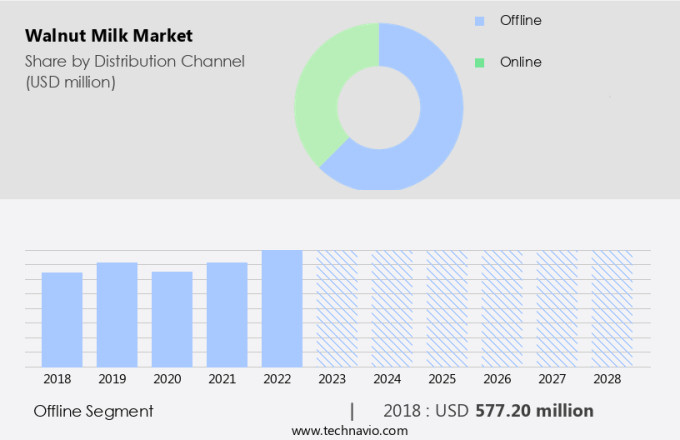Walnut Milk Market Size 2024-2028
The walnut milk market size is forecast to increase by USD 1.15 billion at a CAGR of 14.76% between 2023 and 2028. The market is experiencing significant growth due to several key drivers. The increasing prevalence of breathing issues and itching associated with animal-based products has led to a rise in demand for plant-based alternatives, such as walnut milk. Furthermore, the elderly population is increasingly seeking nutritious content in their diets, making walnut milk an attractive option. Hypermarkets and supermarkets have been the traditional retail channels for walnuts, but digital shopping facilities and e-commerce platforms are gaining popularity. Consumers are increasingly turning to online channels for convenience and access to a wider range of options. Private entities are also investing in the production and distribution of walnut milk, contributing to its availability on retail shelves.
What will be the Size of the Market During the Forecast Period?
The plant-based milk market is witnessing significant traction, with walnut milk emerging as a popular alternative to traditional dairy products. This non-dairy beverage is gaining popularity among consumers seeking lactose-free options due to dietary preferences or allergies. Walnut milk caters to various consumer segments, including those following high-protein diets, keto diet, and those desiring a healthy lifestyle. Its versatility extends beyond beverages, as it is increasingly used in the personal care sector for creating anti-aging products and in the kitchen for preparing sauces, smoothies, and desserts. The unique flavor profile and creamy texture of pure walnut milk and its variations, such as unsweetened, original, mixed, and flavored with chocolate or vanilla, make it an attractive choice for adults and children alike.
Furthermore, walnut milk is rich in essential nutrients, including protein, fatty acids, calcium, and vitamin D, making it a suitable plant-based milk substitute for those who cannot consume dairy products. The market growth for walnut milk can be attributed to several factors. Its nutrient-rich composition, allergen-free nature, and sustainable production process are some of the key drivers. Additionally, the increasing awareness of health and wellness, and the growing preference for plant-based options, are fueling the demand for walnut milk.
Market Segmentation
The market research report provides comprehensive data (region-wise segment analysis), with forecasts and estimates in "USD billion" for the period 2024-2028, as well as historical data from 2018-2022 for the following segments.
- Distribution Channel
- Offline
- Online
- Geography
- North America
- Canada
- US
- Europe
- Germany
- UK
- APAC
- China
- South America
- Middle East and Africa
- North America
By Distribution Channel Insights
The offline segment is estimated to witness significant growth during the forecast period. In the United States market, traditional retail channels, such as supermarkets and hypermarkets, dominate the distribution of walnut milk. These channels offer consumers the opportunity to physically inspect the product before purchase, ensuring satisfaction with the product's quality and freshness. Elderly populations, who may have breathing issues or food sensitivities, often prefer purchasing plant-based milk alternatives, including walnut milk, from these retailers. The expansion of supermarkets and hypermarkets across the country has contributed significantly to the growth of walnut milk sales through these channels. Digital shopping facilities and e-commerce platforms have also emerged as popular distribution channels for walnut milk.
The convenience of online shopping and the availability of a wide range of products have attracted a large customer base. Nutritious content and environmental concerns have driven the demand for plant-based milk alternatives, including walnut milk, on these platforms. Private entities and small businesses have also entered the market, offering walnut milk through their online channels. The accessibility of these channels has made it easier for consumers to purchase walnut milk regardless of their location.
Get a glance at the market share of various segments Request Free Sample
The offline segment accounted for USD 577.20 million in 2018 and showed a gradual increase during the forecast period.
Regional Insights
North America is estimated to contribute 35% to the growth of the global market during the forecast period. Technavio's analysts have elaborately explained the regional trends and drivers that shape the market during the forecast period.
For more insights on the market share of various regions Request Free Sample
Walnut milk has gained popularity in North America, particularly in the US and Canada, due to its numerous health benefits and the increasing preference for plant-based milk substitutes among consumers. The rise in veganism and lactose intolerance, coupled with concerns regarding the consumption of dairy products, has fueled the demand for these alternatives. Walnut milk is rich in essential fatty acids, protein, and nutrients that support the digestive and immune systems.
Furthermore, it is also beneficial for individuals dealing with obesity, hair loss, and chronic diseases. The personal care industry has also embraced walnut milk as an ingredient in various products due to its nourishing properties. As stress reduction diets gain traction, walnut milk's nutrient-dense profile makes it an attractive choice for health-conscious consumers.
Our researchers analyzed the data with 2023 as the base year, along with the key drivers, trends, and challenges. A holistic analysis of drivers will help companies refine their marketing strategies to gain a competitive advantage.
Market Driver
Rising cases of lactose intolerance and allergies associated with soy, hazelnut, and almond milk is the key driver of the market. Lactose intolerance, a condition that hinders the digestion of lactose, a sugar present in milk and dairy products, affects a significant number of individuals, particularly in European countries such as Italy, Germany, Spain, Turkey, Poland, France, and the UK. Symptoms of lactose intolerance include bloating, cramps, diarrhea, and nausea.
As a result, the demand for lactose-free alternatives to cow milk is on the rise. Walnut milk, a type of plant-based milk, is gaining popularity as a dairy substitute among health-conscious consumers, individuals following plant-based diets, and those with lactose intolerance or animal welfare concerns. Its creamy texture and subtle flavor profile make it an excellent addition to various kitchen applications, including smoothies, baking, cooking, coffee, and more. The increasing preference for plant-based milk options is expected to fuel the growth of the market during the forecast period.
Market Trends
Growing demand for sugar-free and organic walnut milk is the upcoming trend in the market. In today's health-conscious society, consumers are increasingly seeking out plant-based alternatives to traditional dairy products due to dietary restrictions or personal preference. Walnut milk, a popular non-dairy beverage, has gained traction in recent years, particularly among those following high-protein diets, lactose-intolerant individuals, and those with allergies to nuts like almonds. Organic walnut milk is a great option for those seeking a healthier lifestyle, as it is free from added sugars and common allergens.
Furthermore, as the demand for sugar-free and allergen-free alternatives continues to rise, many companies are responding by introducing organic walnut milk to their product lines. This trend is expected to persist during the forecast period, as consumers continue to prioritize their health and well-being. Additionally, the use of walnut milk extends beyond the beverage sector, with applications in the personal care sector, including anti-aging products, further expanding its market potential.
Market Challenge
Availability of substitutes is a key challenge affecting the market growth. Walnut milk is a popular plant-based alternative to dairy milk, offering a unique nutty flavor and various health benefits. However, the market for walnut milk faces competition from other plant-based options like almond and soy milk. Consumers are increasingly seeking functional beverages that provide essential nutrients such as protein, calcium, vitamins A, D, B12, potassium, phosphorus, riboflavin, and niacin. Brands catering to this demand offer various dairy alternatives and functional beverages.
Furthermore, the sustainability aspect is also a significant consideration for consumers, with eco-friendly packaging, ethical sourcing, and sustainable operations becoming increasingly important. Brands prioritize environmental sustainability by using renewable energy sources, reducing waste, and minimizing carbon footprint. The nutritional profile of walnut milk aligns with these consumer preferences, making it a viable option in the market. Flavored variants of walnut milk add to its appeal, catering to diverse taste preferences. Brands can differentiate themselves by focusing on these factors and providing transparency through clear labeling.
Exclusive Customer Landscape
The market forecasting report includes the adoption lifecycle of the market, covering from the innovator's stage to the laggard's stage. It focuses on adoption rates in different regions based on penetration. Furthermore, the report also includes key purchase criteria and drivers of price sensitivity to help companies evaluate and develop their market growth analysis strategies.
Customer Landscape
Key Companies & Market Insights
Companies are implementing various strategies, such as strategic alliances, partnerships, mergers and acquisitions, geographical expansion, and product/service launches, to enhance their presence in the market.
Borges International Group SLU - The company offers walnut milk products such as Borges nut drink.
The market research and growth report includes detailed analyses of the competitive landscape of the market and information about key companies, including:
- Borges International Group SLU
- California Walnuts
- Elmhurst Milked Direct LLC
- Hebei Chengde Lolo Co. Ltd.
- Hebei Yangyuan ZhiHui Beverage Co. Ltd.
- Inner Mongolia Yili Industrial Group Co. Ltd.
- Mariani Nut Co.
- RITA Food and Drink Co. Ltd.
- Simple Foods Co. Ltd.
- TH Food Chain Joint Stock Co.
Qualitative and quantitative analysis of companies has been conducted to help clients understand the wider business environment as well as the strengths and weaknesses of key market players. Data is qualitatively analyzed to categorize companies as pure play, category-focused, industry-focused, and diversified; it is quantitatively analyzed to categorize companies as dominant, leading, strong, tentative, and weak.
Research Analyst Overview
Walnut milk, a plant-based milk substitute, has gained significant popularity in recent years due to its nutritious content and suitability for various dietary preferences. This dairy-free beverage is ideal for individuals following lactose-free or vegan diets, as well as those with allergies to nuts like almonds, which are commonly used in other plant-milks. Walnut milk is rich in plant-based protein, making it a popular choice for individuals on high-protein diets, keto diet, and stress reduction diets. The personal care sector has also embraced walnut milk as an ingredient in anti-aging products, thanks to its high content of fatty acids, which contribute to skin health and hair growth.
Furthermore, walnut milk's nutty flavor and creamy texture make it a versatile ingredient for smoothies, baking, cooking, coffee, and plant-based dairy substitutes like greek yogurt, chocolate, and vanilla. Health-conscious consumers are increasingly turning to walnut milk for its nutritional profile, which includes calcium and vitamin D, essential for bone health. The milk is also free from added sugars, additives, and artificial flavors, making it a healthier alternative to animal-based dairy products. Walnut milk is easily accessible on retail shelves in supermarkets and hypermarkets, as well as through digital shopping facilities, e-commerce platforms, and online channels. The convenience of these options caters to the growing demand for this nutritious and eco-friendly beverage.
|
Market Scope |
|
|
Report Coverage |
Details |
|
Page number |
143 |
|
Base year |
2023 |
|
Historic period |
2018-2022 |
|
Forecast period |
2024-2028 |
|
Growth momentum & CAGR |
Accelerate at a CAGR of 14.76% |
|
Market growth 2024-2028 |
USD 1.15 billion |
|
Market structure |
Concentrated |
|
YoY growth 2023-2024(%) |
12.55 |
|
Regional analysis |
North America, Europe, APAC, South America, and Middle East and Africa |
|
Performing market contribution |
North America at 35% |
|
Key countries |
US, China, Germany, Canada, and UK |
|
Competitive landscape |
Leading Companies, Market Positioning of Companies, Competitive Strategies, and Industry Risks |
|
Key companies profiled |
Borges International Group SLU, California Walnuts, Elmhurst Milked Direct LLC, Hebei Chengde Lolo Co. Ltd., Hebei Yangyuan ZhiHui Beverage Co. Ltd., Inner Mongolia Yili Industrial Group Co. Ltd., Mariani Nut Co., RITA Food and Drink Co. Ltd., Simple Foods Co. Ltd., and TH Food Chain Joint Stock Co. |
|
Market dynamics |
Parent market analysis, market growth inducers and obstacles, market forecast, fast-growing and slow-growing segment analysis, COVID-19 impact and recovery analysis and future consumer dynamics, market condition analysis for the forecast period |
|
Customization purview |
If our market report has not included the data that you are looking for, you can reach out to our analysts and get segments customized. |
What are the Key Data Covered in this Market Research and Growth Report?
- CAGR of the market during the forecast period
- Detailed information on factors that will drive the market growth and forecasting between 2024 and 2028
- Precise estimation of the size of the market and its contribution of the market in focus to the parent market
- Accurate predictions about upcoming market growth and trends and changes in consumer behaviour
- Growth of the market across North America, Europe, APAC, South America, and Middle East and Africa
- Thorough analysis of the market's competitive landscape and detailed information about companies
- Comprehensive analysis of factors that will challenge the growth of market companies
We can help! Our analysts can customize this market research report to meet your requirements. Get in touch




